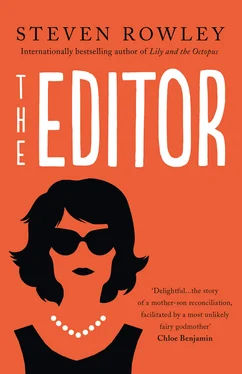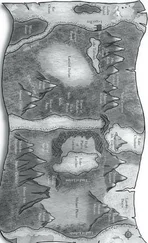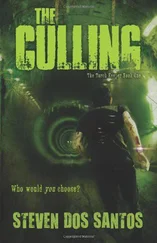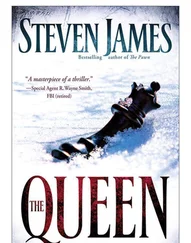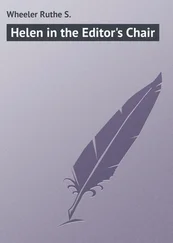I hold up the glass of water as if to say “Cheers,” then down most of it in several gulps, and she gestures for us to retake our seats.
“All set, then?” she asks.
I nod and watch her position herself gracefully in her chair, cross her legs, and pull herself in toward the table. When I take my seat, the chair unexpectedly drops several inches and I have to fuss with a lever underneath to bring it back to a proper height. Flustered, I try to say something, anything, to mask this awkward spectacle. “My middle name is Francis.”
“Beg your pardon?”
“Francis, my middle name is …” I slow to a stop like a windup toy whose crank has run down.
Jacqueline Onassis studies me; I watch her eyes sweep across my face. After an interminable silence she says, “Bobby.”
“Yes, sorry. That needed some prefacing. My middle name is Francis. After Robert Kennedy. I’m … I don’t know why I’m saying this. Your time is valuable. I will focus.” Deep breaths. “I can’t believe you read my book.”
“I read it twice,” she says. She says nothing about my predicament with the chair as I fidget underneath and somehow sink farther, in a second humiliating display.
“Twice?” I try to sound nonchalant.
“Does that surprise you?”
“I’m still getting used to your reading it once.” I finally master the chair’s mechanics and lock it in a respectable raised position. I pull myself into the table and take another sip of water.
She flips through some notes on a pad of legal paper, and I wonder if they are notes about me, about my book. I strain to see, without looking like I’m straining to see; I’m dying to know her every thought. “It’s quite difficult to put down. Once it gets going.”
“A friend told me it’s slow to start.”
“Not slow. Deliberate. In order to deconstruct the American family, you must work diligently to construct it.”
“That’s what I said!” I brighten, and for the first time feel like I find my footing.
“I’m wondering if we could discuss the book, the two of us.” The way she adds “the two of us.” Persuasion. Just us. Alone in a room. Is she doing this on purpose? Is she luring me in only to lowball me with an offer? How can I think of business at a time like this? Whatever she’s doing, it’s artful. I’d be happy to sit here and talk books—my book, any book—until the afternoon is gone.
Until all of the afternoons are gone.
“I would be honored.”
“ The Quarantine ,” she says. It’s an almost out-of-body experience to hear the title of my book in her unmistakable voice. I can hear the word’s Italian origins, the way she says it. Quarantina. Forty Days.
“Yes.”
“Did you live through such a thing?”
“An actual quarantine?”
“An isolation.”
“With my mother?”
“With anyone.”
“No. Not as such. Not formally.”
Jackie nods. “How did you come to it as a framing device?”
I take a deep breath. “We all feel isolated, don’t we? At one time or another?” Does she? Oh, God. “People yearn to connect—it should be easy, and yet it seldom is. That’s true with my own mother. We talk, often past each other, somehow unable to convey meaning. It’s fantasy, I suppose. Putting two characters in tight quarters. Eventually they can’t avoid saying the things they desperately need to say.”
She scribbles a thought on her pad. Scribble is the wrong word; I doubt she’s careless with anything. “And that … fantasy, you call it …”
“I wasn’t going to get my actual mother in a room for any length of time.”
“That led you to write a novel.”
“I didn’t set out to. I considered myself more a writer of short stories. I thought I might have one published in The New Yorker one day, like many of the writers I admire. Updike. Cheever. Mavis Gallant. Dreamed I might, not thought.” Ugh, thought has an element of presumption. I bite the inside of my cheek to slow myself down. “So, one of the early chapters in the book? The one after the service? With the argument over pie? That’s the one I wrote first. When I finished it, I imagined this, finally, was my New Yorker story. And then I showed it to a friend, who encouraged me to write more.” I pause here, expecting her to interject; she looks at me, poised and unblinking. “I realize now how unsatisfying it would have been as a short story. That it was inherently … incomplete.”
“What a delightful note to receive as a writer. More. ”
I smile at her like a child asking for juice.
“And you. Are you …” She checks her notepad. “Russell?”
“The character in the book? I’m not not Russell.” Check yourself, James. Now is not the time to be cute. “He is a version of me, I suppose, in that we are both seeking and searching—yearning to understand.”
“I would love to know more about the mother.”
“What would you like to know?”
“What would you like to tell me?”
Afraid this is some unanswerable riddle, a test I’m doomed to fail, I revert to her previous question. “If you’re asking if she’s my mother, she would say no.”
“Has she read the manuscript?”
“No.” As soon as it comes out of my mouth I realize just how harsh it sounds on its own, so I say it again, softer this second time. “No.” And then, because it’s a point of contention between us, I add, “Not even once.”
Jacqu—Mrs. Onassis taps her pen twice on her notepad. “Why not?”
“I wish she would. I suppose she’s afraid of what she’ll see.”
“I saw something quite lovely.”
My eyes are growing wet. Mortifying. It’s a little early in the year to pass it off as allergies; I blink twice in an effort to stop it. “I thank you for saying so, but it’s almost beside the point. She doesn’t want to be written about.”
Mrs. Onassis sets her pen down. “Well, your mother’s in good company there.”
“I suppose so,” I say, smiling so that she knows I understand she’s referring to herself.
“So why did you choose to write about her?”
“I’m not sure I did. Choose. I thought I would have endless stories. Deep, complicated, rich narratives that had profound things to say. I started a half-dozen novels centered on characters I thought would jump right off the page. But after numerous starts and stops they all seemed kind of flat in comparison to the most complicated character I knew.”
“Your mother.”
“My mother.” I glance down at the pad between us and it reminds me of the terror of blank pages. “So, desperation, I guess?”
Mrs. Onassis raises an eyebrow. “Well, I think you’ve observed her quite eloquently. I admired her.”
I look down at my nails and am embarrassed to see it’s been a while since I’ve cut them. I quietly move to sit on my hands.
“Since I’m not asking her, I’m asking you—is she your mother?”
“Absolutely.” And then, since I’m also deeply protective of her, I add, “A carbon copy. One that I can place just outside our relationship and stretch and mold and make malleable. Get inside. One that serves the novel, I hope. And one that I can possibly come to understand.”
Mrs. Onassis makes additional notes and I wonder if she’s writing down what I’m saying, which fuels my self-consciousness. Are these thoughts worth recording? When she looks up she asks, “One you can come to set free.”
Your mother’s in good company. Sitting across from someone so well known, I can’t help but conjure a slideshow of every image I have of her, that every American has. The iconic moments, the idyllic portraits. Any one of them is imposing; together they are irrepressible. I try desperately to clear them from my mind—to focus on the woman in front of me—but in person she’s no less an artfully framed photograph: stoic, quiet, still. The exotic bird, caged for voyeurs like myself. Have I done that to my mother? Cataloged her in snapshots? Confined her to a lifetime of observation? “One I can come to set free. I like that.”
Читать дальше
